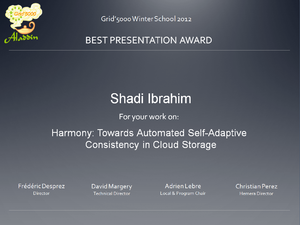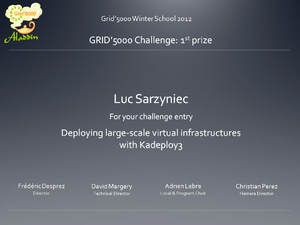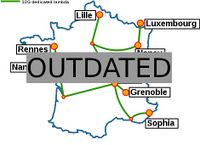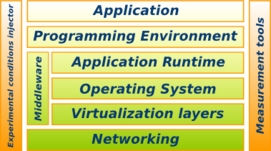Grid5000:Home
|
|
Latest updates from Grid'5000 users
- Publications
Five random publications that benefited from Grid'5000 (at least 2932 overall):
- Emmanuel Medernach, Gaël Vila, Axel Bonnet, Sorina Camarasu-Pop. ReproVIP Report #2.1.1 Application Deployment Strategies. CREATIS Université Lyon 1. 2024. hal-04551771 view on HAL pdf
- Fatmir Asllanaj, Sylvain Contassot-Vivier, Guilherme C Fraga, Francis H.R. França, Roberta J.C. da Fonseca. New gas radiation model of high accuracy based on the principle of weighted sum of gray gases. Journal of Quantitative Spectroscopy and Radiative Transfer, 2024, 315, pp.108887. 10.1016/j.jqsrt.2023.108887. hal-04375649 view on HAL pdf
- Mouhamed Amine Bouchiha. Advancing Blockchain-based Reputation Systems : Enhancing Effectiveness, Privacy Preservation, and Scalability. Computer Science cs. Université de La Rochelle, 2024. English. NNT : 2024LAROS006. tel-04874759 view on HAL pdf
- Sofía Callejas, Hernan Lira, Andrew Berry, Luis Martí, Nayat Sanchez-Pi. No Plankton Left Behind: Preliminary results on massive plankton image recognition. 1th Latin American High Performance Computing Conference - CARLA 2024, Ginés Guerrero; Jaime San Martín; Esteban Meneses; Carlos J Barrios H; Carla Osthoff; Jose M Monsalve Diaz, Sep 2024, Santiago de Chile, Chile. hal-04803602 view on HAL pdf
- François Portier, Lionel Truquet, Ikko Yamane. Nearest Neighbor Sampling for Covariate Shift Adaptation. 2024. hal-04645530 view on HAL pdf
Latest news
Grid'5000 users win second prize at CCGRID 2013's SCALE challenge
Snooze based entry running on Grid'5000 entry wins 2nd prize at CCGrid 2013 SCALE challenge: well done Matthieu and Anne-Cécile for defending the entry titled Scalability of the Snooze Autonomic Cloud Management System by Eugen Feller, Christine Morin, Matthieu Simonin, Anne-Cécile Orgerie, and Yvon Jégou.
Grid'5000 users finalists of the SCALE'2013 challenge
Two submissions (out of five) from Grid'5000 users took part in the final of the international SCALE'2013 challenge (held with CCGrid'2013):
- D. Balouek, A. Lèbre, F. Quesnel Flauncher and DVMS -- Deploying and Scheduling Thousands of Virtual Machines on Hundreds of Nodes Distributed Geographically
- Eugen Feller, Christine Morin, Matthieu Simonin, Anne-Cécile Orgerie, and Yvon Jégou -- Scalability of the Snooze Autonomic Cloud Management System.
The first proposition presents the deployment and scheduling of thousands of virtual machines, conducted with the Flauncher and DVMS frameworks, across the Grid'5000 testbed. The frameworks have been able to deploy and schedule up to 10000 VMs during the tests. This research has been conducted in the context of the INRIA Hemera initiative.
The second proposition presents the Snooze architecture and focus on the following aspects :
- System set up scalability and resources consumption,
- Self-healing capabilities.
The deployment of Snooze were distributed over several sites of the Grid'5000 testbed. The framework has been able to start 11000 of system services, recover thousands of failures and used to launch large hadoop/mapreduce experiments. This research has been conducted in the context of the INRIA Snooze ADT.
Grid'5000 tutorial during ComPAS'2013
The ComPAS'2013 conference (replacing RenPar, SympA and CFSE), to be held in Grenoble between January 15th and 18th, will feature a Grid'5000 tutorial.
Grid'5000 Winter School 2012 award winners announced
The Grid'5000 winter school took place between Decembre 3rd, 2012 and December 6th, 2012 in Nantes. This highly successful edition brought together 70 registered participants for 4 days of tutorials and talks focusing on best-practices, results and links to other tools for experiment-driven research.
Two awards were given during the event :
|
Best presentation award to Shadi Ibrahim |
1st prize for the Grid'5000 challenge 2012 to Luc Sarzyniec |
Grid'5000 at a glance
- Grid'5000 is a scientific instrument for the study of large scale parallel and distributed systems. It aims at providing a highly reconfigurable, controlable and monitorable experimental platform to its users. The initial aim (circa 2003) was to reach 5000 processors in the platform. It has been reframed at 5000 cores, and was reached during winter 2008-2009.
- The infrastructure of Grid'5000 is geographically distributed on different sites hosting the instrument, initially 9 sites in France (10 since 2011). Porto Alegre, Brazil is now officially becoming the first site abroad.
Sites:
- Grid'5000 is a research effort developing a large scale nation wide infrastructure for large scale parallel and distributed computing research.
- 19 laboratories are involved in France with the objective of providing the community a testbed allowing experiments in all the software layers between the network protocols up to the applications.
The current plans are to extend from the 9 initial sites each with 100 to a thousand PCs, connected by the RENATER Education and Research Network to a bigger platform including a few sites outside France not necessarily connected through a dedicated network connection. Sites in Brazil and Luxembourg should join shortly, and Reims has now joined.
All sites in France are connected to RENATER with a 10Gb/s link, except Reims, for the time linked through a 1Gb/s
This high collaborative research effort is funded by INRIA, CNRS, the Universities of all sites and some regional councils.
ALADDIN-G5K : ensuring the development of Grid'5000
For the 2008-2012 period, Engineers ensuring the development and day to day support of the infrastructure are mostly provided by INRIA, under the ADT ALADDIN-G5K initiative.
HEMERA: Demonstrating ambitious up-scaling techniques on Grid'5000
Héméra is an INRIA Large Wingspan project, started in 2010, that aims at demonstrating ambitious up-scaling techniques for large scale distributed computing by carrying out several dimensioning experiments on the Grid’5000 infrastructure, at animating the scientific community around Grid’5000 and at enlarging the Grid’5000 community by helping newcomers to make use of Grid’5000.
Initial Rationale
The foundations of Grid'5000 have emerged from a thorough analysis and numerous discussions about methodologies used for scientific research in the Grid domain. A report presents the rationale for Grid'5000.
In addition to theory, simulators and emulators, there is a strong need for large scale testbeds where real life experimental conditions hold. The size of Grid'5000, in terms of number of sites and number of processors per site, was established according to the scale of the experiments and the number of researchers involved in the project.
Current funding
As from June 2008, INRIA is the main contributor to Grid'5000 funding.
INRIA |
CNRS |
UniversitiesUniversity Joseph Fourier, Grenoble |
Regional councilsAquitaine |






